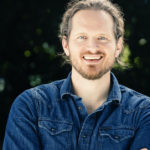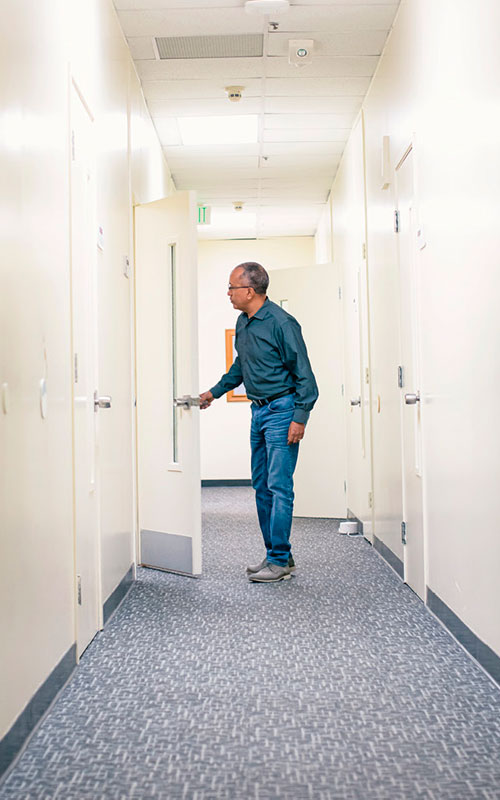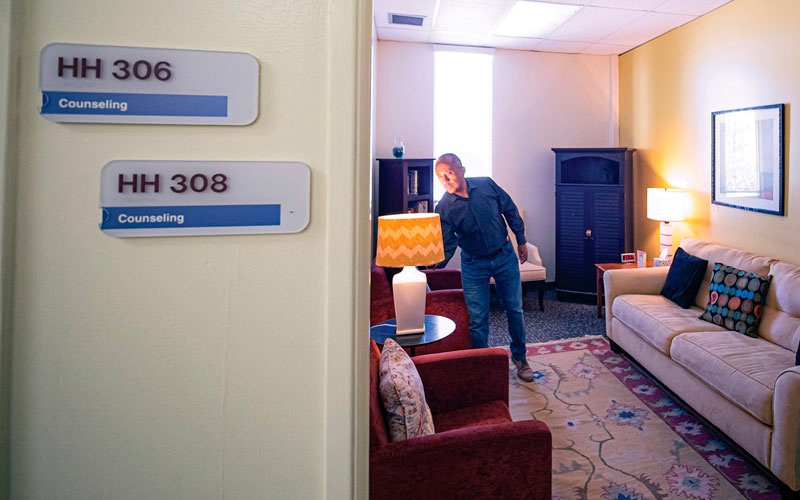
When Tsega Worku (MSMFT ’97) immigrated to the United States from Ethiopia at age 19 and enrolled as a student at Citrus College, he first thought he would study engineering, but God had other plans. He says, “During my last semester, I took a psychology class and I thought, ‘Hmm. This is interesting.’” This class led him to switch his major to psychology at Cal Poly Pomona and begin working at Sycamores, a residential facility for emotionally disturbed youth. But as a committed Christian, he struggled to reconcile his faith with psychology and wondered if they were compatible.
Shortly after arriving in Pasadena, he began attending a small Ethiopian church pastored by a Fuller doctoral student, Alemayehu Mekonnen. “His sermons were very powerful, so impactful that they bothered me the whole week,” Tsega says. “It was the first time I heard that kind of challenging message, so I took time to think about it and to process it. Then I started reading the Bible carefully, trying to figure out the foundation of our faith, while studying psychology as an undergraduate student.”
One day, while browsing at the Lighthouse Christian Bookstore in Pasadena, he came across a book that was authored by a Christian psychologist. Amazed that such a thing as a Christian psychologist even existed, he initiated a hunt for a theology degree to pair with his psychology degree.
When he called Fuller, he was disappointed to discover that they did not have undergraduate degrees in theology. But his heart leapt when he was told they had a graduate school of psychology. When he learned that applications for the upcoming school year were due that very day, he immediately applied.
In fact, Tsega was so excited about the idea that the Christian faith could be compatible with psychology, he forgot to ask about the cost of tuition. This became a problem, given that he was an immigrant with no Green Card, meaning he was ineligible for financial assistance. When he was accepted to Fuller’s School of Psychology, he went to the registrar’s office, where they informed him of the price tag for his first quarter. He almost fainted.
As Tsega turned to leave, the registrar took pity and allowed him to register for one quarter of classes, with a warning to discontinue if he could not develop a plan to meet his financial needs. “I was barely making rent, but I said, ‘Okay, I just want to give it a try.’ I remember, on the first day of class, when the professor started the class with a prayer. That was it. I got my answer: You can keep your faith and be a professor of psychology! So for me, just knowing that was enough.”
YOLANDA “YO” MILLER leads spiritual formation groups for Fuller, the De Pree Center, and Soul Care in Boulder, Colorado. You can learn more about her and her work as a soul coach at yo-miller.com.

NATE HARRISON is director of creative production, video, and photography
at FULLER studio. Find more of his work at NateCHarrison.com.
When Tsega Worku (MSMFT ’97) immigrated to the United States from Ethiopia at age 19 and enrolled as a student at Citrus College, he first thought he would study engineering, but God had other plans. He says, “During my last semester, I took a psychology class and I thought, ‘Hmm. This is interesting.’” This class led him to switch his major to psychology at Cal Poly Pomona and begin working at Sycamores, a residential facility for emotionally disturbed youth. But as a committed Christian, he struggled to reconcile his faith with psychology and wondered if they were compatible.
Shortly after arriving in Pasadena, he began attending a small Ethiopian church pastored by a Fuller doctoral student, Alemayehu Mekonnen. “His sermons were very powerful, so impactful that they bothered me the whole week,” Tsega says. “It was the first time I heard that kind of challenging message, so I took time to think about it and to process it. Then I started reading the Bible carefully, trying to figure out the foundation of our faith, while studying psychology as an undergraduate student.”
One day, while browsing at the Lighthouse Christian Bookstore in Pasadena, he came across a book that was authored by a Christian psychologist. Amazed that such a thing as a Christian psychologist even existed, he initiated a hunt for a theology degree to pair with his psychology degree.
When he called Fuller, he was disappointed to discover that they did not have undergraduate degrees in theology. But his heart leapt when he was told they had a graduate school of psychology. When he learned that applications for the upcoming school year were due that very day, he immediately applied.
In fact, Tsega was so excited about the idea that the Christian faith could be compatible with psychology, he forgot to ask about the cost of tuition. This became a problem, given that he was an immigrant with no Green Card, meaning he was ineligible for financial assistance. When he was accepted to Fuller’s School of Psychology, he went to the registrar’s office, where they informed him of the price tag for his first quarter. He almost fainted.
As Tsega turned to leave, the registrar took pity and allowed him to register for one quarter of classes, with a warning to discontinue if he could not develop a plan to meet his financial needs. “I was barely making rent, but I said, ‘Okay, I just want to give it a try.’ I remember, on the first day of class, when the professor started the class with a prayer. That was it. I got my answer: You can keep your faith and be a professor of psychology! So for me, just knowing that was enough.”
YOLANDA “YO” MILLER leads spiritual formation groups for Fuller, the De Pree Center, and Soul Care in Boulder, Colorado. You can learn more about her and her work as a soul coach at yo-miller.com.
NATE HARRISON is director of creative production, video, and photography
at FULLER studio. Find more of his work at NateCHarrison.com.


When it was time to enroll for the next quarter, the registrar couldn’t resist giving Tsega one more chance. Miraculously, halfway through his second quarter, Tsega received a long-awaited letter from immigration, notifying him that he had won the lottery for his Green Card. Tsega’s dogged determination and faith (and that of the registrar) had paid off. With the Green Card, he was able to gain the student loan he needed to complete his degree.
By 2003, Tsega had worked his way up to assistant director at Sycamores, but he felt something was missing. “It wasn’t feeding my soul. It was a lot of paperwork, a lot of bureaucratic stuff that is necessary—but it took away the joy I have working with people.”
That, coupled with him wanting to better prioritize time with his family, led him to make some radical vocational shifts. He decided to only work part-time positions at a local college and school district. He also began a part-time private practice during the day in order to keep his evenings free for his family. And he started volunteering as a clinical supervisor at the counseling center at Lake Avenue Church, where he had been attending after the Ethiopian congregation he’d joined moved to Los Angeles.
When the director of Lake Avenue’s counseling center left in 2010, the staff pressed Tsega to apply. Fearful of getting pulled back into the isolation of administration, he declined. But when the executive pastor at that time, Chuck Olson, asked him to apply, he couldn’t refuse. He agreed on the condition that he would work part time.
Tsega’s limited schedule forced him to creatively reimagine how the counseling center could function effectively. Rather than viewing himself as the lead service provider, he reinvented his role and became an overseer, building on the existing model of volunteerism, partnership, and relying on outside resources.
Tsega expanded the partnership with Fuller’s School of Psychology faculty and students. The counseling center became not only a service provider but also a training ground for future therapists. He staffed the center with MFT trainees who gained valuable hours of experience working with clients, while receiving supervision and practicum training from Fuller professors like Terry Hargrave, Miyoung Yoon Hammer, as well as other volunteer professionals. He also recruited qualified volunteers to lead marriage seminars and other support groups, such as grief care, anger management, forgiveness, and addiction recovery at the church and the counseling center.
Tsega realized that some of the church members who came to the center for donation-based services actually qualified for services covered by their insurance or other existing counseling providers in the community. They began referring these clients out to their eligible providers and mainly offered services on a sliding scale basis to the wider community who did not have access to counseling.


These strategies ended up scaling back the operating costs of the center, while expanding the reach of its ministry by serving not only the clients but also the existing counseling providers in the community. This revisioning of the relationship between church and therapy led Tsega to consult for several other churches seeking similar innovative partnerships.
In this work, Tsega especially loves to consult with pastors. “I say, if you don’t have members struggling with mental illness in your church, it’s really a social club. It’s not the real church, you know? The question is, what do you do with those people? Seven or eight percent of our church family members may need professional care to really manage and deal with life challenges. Then there will be two or three percent who need extra grace. For those, you just have to accept them, come alongside them, and wrap them with love and grace.”
Tsega recognizes that without guidance and support, just a few of these members can quickly deplete a pastor’s resources. “This kind of stuff excites me—consulting with pastors, helping them keep healthy boundaries and pointing them to resources in the community. By creating healthy boundaries, you’re actually helping the struggling person know what they can and cannot expect from their pastors and lay leaders. At the same time, this helps pastors be more available to the rest of the congregation.”
Like the relationship between Lake Avenue Church and the counseling center, he views this work with pastors as a partnership. Like any well-trained therapist, his goal is to help pastors discover effective approaches when dealing with people’s problems rather than giving them solutions. “I am very mindful that my role is not to solve problems but to help them process and to discover the solution together,” he says. “When someone calls and says, ‘We have this person in our group that we are struggling with, can you please take care of them?’ They know the answer is, ‘No, but I can talk to you. And maybe together we can find a way to manage whatever challenge you have.’”
Tsega has come to a place where the truth of theology has met the lovingkindness of psychology: “They don’t clash. If anything, they complement one another. As Christian therapists, it can sometimes be difficult to integrate our faith with our work, but it’s a beautiful thing to be able to do this integration freely at a church. If we are brave and courageous enough to address both the theological and psychological issues of life, we will discover that they can complement each other in leading people to freedom and truth in Christ Jesus.”
He continues, “In the old days when people had problems, the first place they would go to is their church. After prayer and good advice, they would go out to get help from doctors, financial advisors, etc. Unfortunately, now, when people have problems—especially mental health challenges—the first place they stop going to is the church. The church needs to be the safe place where we can bring all our struggles and to be a catalyst for restoration and healing. The church needs to go back to what it used to be for families and the community. The church has to be a safe place where hurt people go.”
Returning to Uganda after their time in seminary, Grace and Yosam Manafa walk alongside others as they ask together what it looks like to live out our theology in every area of our lives.